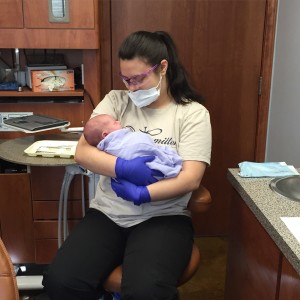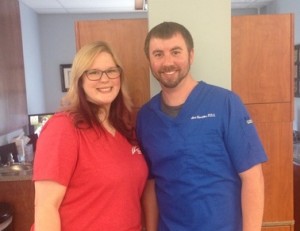 A frenectomy can help when your baby can’t latch
A frenectomy can help when your baby can’t latch
When a baby cannot properly breastfeed, there are immediate problems for the infant and mother. A baby whose tongue cannot function or has limited mobility because the tongue has an enlarged attachment to the lingual frenum (floor of the mouth) or the upper lip will often be unable to properly latch to the breast.
This condition is called ankyloglossia. It can be fixed with an operation known as a lingual frenectomy procedure. The frenulum of the tongue (or lingual frenulum) is a small fold of mucous membrane extending from the floor of the mouth to the midline of the underside of the tongue. In a frenectomy, this is trimmed to allow the tongue to move freely.
Problems for the infant with ankyloglossia may include poor latch resulting in:
- Reflux.
- Colic and excessive gas.
- Inadequate milk intake
- Poor weight gain
- Extended nursing episodes
- Falling asleep
- Early weaning from the breast or refusal to breastfeed at all.
This robs the child of bonding opportunities and the natural immunities and health benefits that mothers give their babies through breastfeeding. As an untreated child grows older, there may be a diagnosis of tongue tie, causing problems with speech and eating.
Breastfeeding is a health issue
There can be long-term problems when babies cannot feed at the breast. The American Academy of Pediatrics says that “parents should be aware that exclusive breastfeeding is sufficient to support optimal growth and development for approximately the first 6 months of life and provides continuing protection against diarrhea and respiratory tract infection.” They consider breastfeeding an infant a basic health issue, not a lifestyle choice.
Other potential problems for the baby include increased risk of SIDS, developmental abnormalities, dental decay, speech problems, orthodontic problems, esthetic problems, and even future periodontal disease.
The new mother can be negatively affected, as well, when her baby has trouble breastfeeding. Poor latching can result in physical breast pain, cracked or bleeding nipples, infection, plugged ducts, and other problems. It can also be a stimulus for postpartum depression, disappointment, and feelings of inadequacy, frustration, and guilt. Successful breastfeeding benefits for the mother include easier weight loss and some cancer immunities.
Laser frenectomy cuts with light, not scalpels
By performing a laser frenectomy rather than a complicated conventional surgery, the benefits to infant and mother are clear. Laser surgery is safe and quick, with no known complications. The cutting is done by laser light energy, not scalpels. There is no need for sedation or an operating room, no allergic or drug reactions, and there is virtually no chance of infection.
The procedure takes minutes in our office, it significantly reduces the risk of any bleeding, and the infant is returned to mom for immediate feeding. Most importantly, laser surgery is more precise. We have special procedures and protocols used to treat these precious infants that reduce anxiety in child and mother.
 American Academy of Pediatrics Policy on Breastfeeding Benefits:
American Academy of Pediatrics Policy on Breastfeeding Benefits:
For the baby
Breastfeeding decreases the possibility that your baby will get a variety of infectious diseases, ear infections, diarrhea, etc.
For the mother
Breastfeeding mothers return to their pre-pregnancy weight faster and have a reduced risk of breast and ovarian cancer. They also experience less postpartum bleeding, as the hormones that help with breastfeeding also make the uterus contract.
For the family
Breastfeeding facilitates bonding. Fathers and other children can participate by helping the mother with burping and rocking the baby, making sure the mother is eating and drinking enough, and helping with breast pump equipment and bottles.
For the community
Breastfeeding is lean, green, and clean. Breastfed babies are at a lower risk of being obese children. Breastfeeding won’t put a huge dent in your wallet. It saves water, and it doesn’t use energy for manufacturing or pollute the environment with garbage or manufacturing air pollution. There is no worry about the risk of contamination from bacteria or other substances. It is always fresh, at the right temperature, and ready to feed.
Source: www2.aap.org